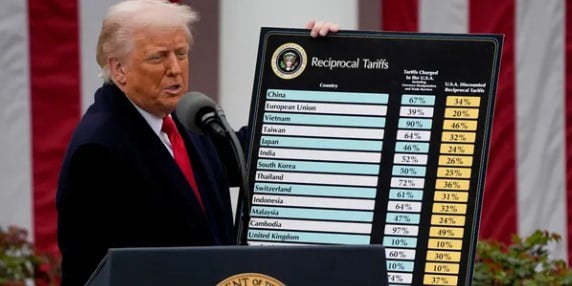Court Rules Trump’s Tariffs Were Illegal
By: Ark-La-Tex Staff Writer
A U.S. federal court has ruled that former President Donald Trump's “liberation day” tariffs violated the International Emergency Economic Powers Act (IEEPA), dealing a significant blow to a signature component of his administration’s trade strategy.
The decision, issued Friday by the U.S. District Court for the District of Columbia, concluded that the tariffs, imposed on select imports from countries including China, Mexico, and Germany, exceeded the statutory limits of presidential authority under emergency economic powers law. The ruling could have long-term implications for executive discretion in trade policy and economic sanctions.
Background
The “liberation day” tariffs, unveiled in 2020 and expanded in subsequent years, aimed to reduce reliance on foreign manufacturing and pressure nations accused of unfair trade practices. They were enacted through executive orders invoking national emergency powers, citing threats to the U.S. industrial base and economic security.
Supporters of the tariffs argued that the measures protected American jobs, revived domestic manufacturing, and forced foreign governments to renegotiate trade deals. Critics claimed they were applied too broadly, lacked Congressional oversight, and raised costs for American businesses and consumers.
The Court’s Ruling
In its 63-page opinion, the court found that the Trump administration failed to meet the legal threshold for invoking emergency economic powers. Judge Marcia Fields wrote that the IEEPA was “designed to address extraordinary international threats, not to serve as a blanket authorization for broad economic policy changes.” The court further noted that the administration had not demonstrated an immediate national security threat justifying the tariffs.
The ruling does not immediately invalidate current tariffs still in place but opens the door for legal challenges from affected companies and potential refunds for duties paid under the now-invalidated policy.
Support and Opposition
Pros of the Tariffs:
-Advocates say the tariffs gave the U.S. leverage in trade negotiations and helped rebalance trade deficits.
-Some manufacturers, particularly in steel and aluminum, reported increased domestic production and job growth during the tariff period.
-The policy was seen as a bold assertion of economic sovereignty and a break from what Trump called "unfair globalism."
Cons of the Tariffs:
-Multiple industry groups, including the U.S. Chamber of Commerce and National Retail Federation, argued the tariffs disrupted supply chains and led to higher costs for American consumers.
-Economists warned that retaliatory tariffs from other countries hurt American exporters, especially farmers and auto manufacturers.
-Legal scholars raised concerns about executive overreach and the precedent it set for future administrations.
Political and Legal Implications
While the ruling is a judicial rebuke of a cornerstone Trump policy, it may not be the final word. Legal experts expect the decision to be appealed, possibly reaching the Supreme Court. Meanwhile, current and future administrations may need to reevaluate the limits of executive authority in economic policy.
President Trump issued a brief statement calling the decision politically motivated and vowing to restore American economic independence. White House officials declined to comment on the ruling’s specifics but emphasized the importance of trade measures that are both effective and legally sound.
What’s Next
Legal analysts say the court’s decision could prompt a wave of litigation from importers seeking compensation for duties paid under the tariffs. Congress may also revisit legislation governing emergency economic powers to clarify or revise the scope of presidential authority.
For now, the ruling marks a significant development in the ongoing debate over U.S. trade policy, executive power, and the role of courts in shaping economic governance.
